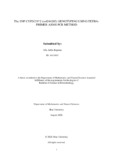| dc.contributor.advisor | Hossain, M. Mahboob | |
| dc.contributor.advisor | Akash, Md. Mahmudul Hasan | |
| dc.contributor.author | Rupoma, Afia Adiba | |
| dc.date.accessioned | 2021-03-24T09:49:02Z | |
| dc.date.available | 2021-03-24T09:49:02Z | |
| dc.date.copyright | 2020 | |
| dc.date.issued | 2020-08 | |
| dc.identifier.other | ID: 16136031 | |
| dc.identifier.uri | http://hdl.handle.net/10361/14387 | |
| dc.description | This thesis is submitted in partial fulfilment of the requirements for the degree of Bachelor of Science in Biotechnology 2020. | en_US |
| dc.description | Catalogued from PDF version of thesis. | |
| dc.description | Includes bibliographical references (pages 46-49). | |
| dc.description.abstract | Drugs are used to treat and cure disease. But the same drug with the same dose might not be useful for other individuals. Through Pharmacogenetics study, how people respond differently to drug therapy based upon their genetic makeup or genes can be determined. The latest research eliminates the trial-and-error approach to medication options and therefore restricts patients' access to medications that are either not effective or harmful to them. Single Nucleotide Polymorphisms (SNPs) holds the key for identifying the probability of an individual's vulnerability to various diseases and drug reaction. Most SNPs are functionally silent, occurring in non-coding or non-regulatory genome regions. Some of the SNPs cause altered protein structure or expression, however. These biologically functional SNPs in both health and disease are considered the essence and substrate of human diversity.
A clinically significant SNP CYP2C19*2 (rs4244285) was selected for this study based on its heterozygosity. This SNP is a poor metabolizer of the drug Clopidogrel. Tetra ARMS PCR primer set was designed to detect the allelic condition of this SNP in Bangladeshi individuals. These primer sets can detect both wild type and mutant alleles. Buccal samples of healthy volunteers were collected using 0.9% NaCl in distilled water. DNA from these samples was extracted using The Phenol Chloroform method. PCR reaction was optimized by trial and error. The first PCR reaction gave clear bands at the allocated area. From the PCR reaction and afterward gel electrophoresis it was found that one sample was heterozygous mutant (G/A) and two samples were homozygous wild type (G/G) for this SNP.
This SNP genotyping protocol is effective and less expensive. As this experiment is conducted over Bangladeshi individuals, the measurement of the occurrence of this allele will help to evaluate the medication dosage to prevent side effects or overdose of the medication in the Bangladeshi population. | en_US |
| dc.description.statementofresponsibility | Afia Adiba Rupoma | |
| dc.format.extent | 49 pages | |
| dc.language.iso | en_US | en_US |
| dc.publisher | Brac University | en_US |
| dc.rights | Brac University theses are protected by copyright. They may be viewed from this source for any purpose, but reproduction or distribution in any format is prohibited without written permission. | |
| dc.subject | Single Nucleotide Polymorphisms | en_US |
| dc.subject | PCR | en_US |
| dc.subject | SNP genotyping protocol | en_US |
| dc.title | The SNP CYP2C19*2 (rs4244285) genotyping using tetra primer arms PCR method | en_US |
| dc.type | Thesis | en_US |
| dc.contributor.department | Department of Mathematics and Natural Sciences, Brac University | |
| dc.description.degree | B. Biotechnology | |

